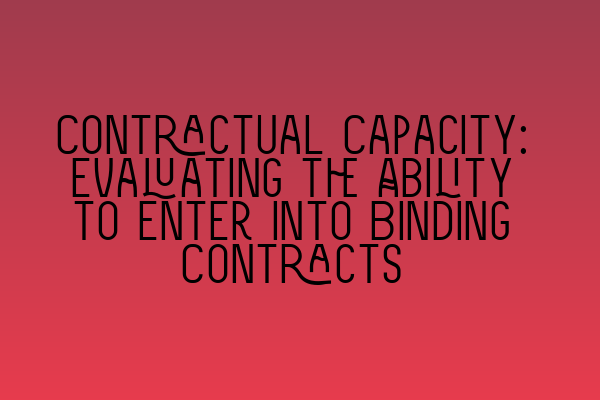Contractual Capacity: Evaluating the Ability to Enter into Binding Contracts
Welcome to our SQE Contract Law blog series. In this post, we will be discussing the important concept of contractual capacity and how it plays a crucial role in determining the validity of a contract. Understanding contractual capacity is essential for any solicitor, as it forms the basis for evaluating an individual’s ability to enter into legally binding agreements.
What is Contractual Capacity?
Contractual capacity refers to the legal ability of an individual to enter into a contract and be bound by its terms. Not everyone has the same level of capacity when it comes to entering into contracts. Factors such as age, mental capacity, and the presence of any undue influence or duress can impact an individual’s capacity to enter into a binding agreement.
It is crucial to assess the contractual capacity of each party involved in a contract to ensure that the agreement is valid and enforceable. Failing to do so could result in serious legal implications and potential disputes down the line.
Age and Contractual Capacity
One of the primary factors that can impact an individual’s contractual capacity is their age. In most jurisdictions, minors (individuals under the age of 18) are considered to have limited capacity when it comes to entering into contracts. However, there are exceptions to this general rule.
For example, in certain situations, minors can enter into contracts for necessaries, such as food, clothing, and shelter. This allows them to obtain essential goods and services even though they may not have full contractual capacity.
It is important to note that contracts entered into by minors are typically voidable, meaning that the minor has the legal right to disaffirm the contract before reaching the age of majority. However, once the minor reaches the age of majority, they may choose to ratify the contract and make it legally binding.
To learn more about legal challenges and pitfalls you may encounter regarding contractual capacity, check out our article on Navigating Legal Challenges and Pitfalls in Your Practice.
Mental Capacity and Contractual Capacity
Another crucial aspect of contractual capacity is the mental capacity of the parties involved. It is essential to assess whether an individual has the mental capacity to fully understand the terms and nature of the contract.
Individuals suffering from mental impairments, such as cognitive disabilities or mental illnesses, may have limited or no contractual capacity. In such cases, it may be necessary to appoint a guardian or seek court approval for contracts involving these individuals to ensure that their best interests are protected.
Undue Influence and Contractual Capacity
Undue influence occurs when one party exerts pressure or manipulates another party to enter into a contract against their will or better judgment. This can significantly impact the affected individual’s contractual capacity, as they are not truly entering into the agreement of their own free will.
An individual who has been subject to undue influence may have the ability to challenge the contract’s validity in court. It is essential for solicitors to be vigilant in identifying any signs of undue influence during the contract negotiation process.
For a comprehensive comparison between the roles of barristers and solicitors, take a look at our article on Barrister vs. Solicitor: A Comprehensive Comparison.
Duress and Contractual Capacity
Duress occurs when one party uses threats or coercion to force another party into entering into a contract. The presence of duress can greatly undermine an individual’s contractual capacity, as they are essentially compelled to enter into the agreement out of fear or intimidation.
If an individual can prove that they entered into a contract under duress, they may be able to void or rescind the contract. Solicitors need to be aware of the signs of duress and take appropriate action to protect their clients’ rights and interests.
Informed Consent and Contractual Capacity
One of the key principles in assessing contractual capacity is the concept of informed consent. For a contract to be valid, each party involved must have a proper understanding of the terms and consequences of the agreement.
Solicitors play a vital role in ensuring that their clients have the necessary information to make informed decisions. This includes explaining complex legal concepts, highlighting potential risks, and clarifying any issues or ambiguities in the contract.
To better understand the SRA Competence Statement and its significance for solicitors, check out our article on Understanding the SRA Competence Statement: A Guide for Solicitors.
Conclusion
Contractual capacity is a vital aspect of contract law. Assessing each party’s ability to enter into a contract is essential for solicitors to ensure the validity and enforceability of agreements. Factors such as age, mental capacity, undue influence, duress, and informed consent all play a role in determining an individual’s contractual capacity.
As solicitors, it is our responsibility to navigate these complexities, protect our clients’ interests, and ensure that contracts entered into are fair and legally binding. By understanding the intricacies of contractual capacity, we can provide our clients with the guidance and support they need to make informed decisions.
To explore different solicitor specializations and find your niche in the legal field, read our article on Exploring Different Solicitor Specializations: Finding Your Niche.
If you’re considering a career in law and are looking for the top recommendations for law schools in the UK, don’t miss our article on Top Recommendations for Law Schools in the UK.
